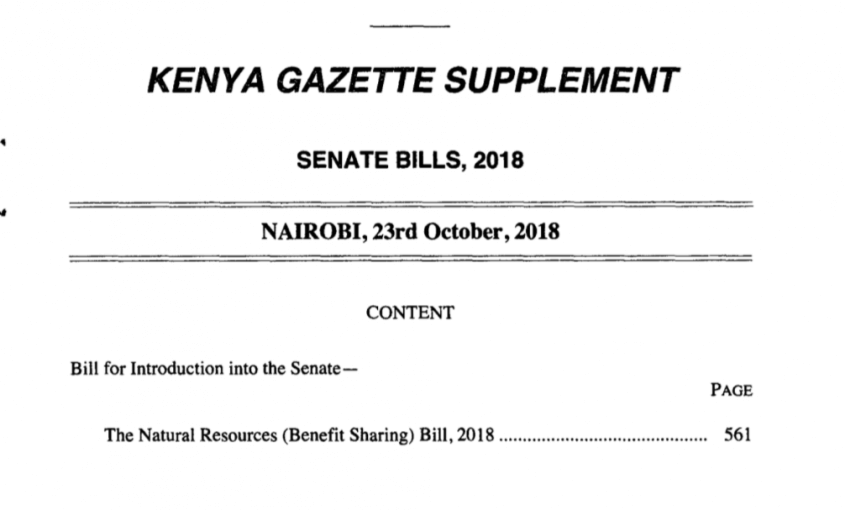KWCA Position on Natural Resources (Benefit Sharing Bill), 2018
KWCA this morning submitted the Natural Resources (Benefit Sharing) Bill, 2018 memorandum to members of the Senate Standing Committee on Land, Environment and Natural Resources on 27th February 2019.
KWCA submitted the memorandum on behalf of its 160 community and private wildlife conservancies covering an area of 6.5million hectares (11% of Kenya’s Landmass) and collectively representing over a million households as follows;
GENERAL SUBMISSION
While the objective of Bill is to establish a system of benefit sharing in exploitation and use of natural resources, listed in section 3, the Bill, by including wildlife, has the unintended consequence of adversely affecting the existing benefit sharing arrangement largely managed by the local communities, further driving wildlife conservation in community and private land beyond the tipping point.
In the foregoing, it is KWCA’s submission that the Natural Resource Benefit Sharing Bill be withdrawn in its entirety or amended by deleting section 3 (d) to exclude wildlife resources.
General Grounds:
- The Bill is drafted within the concepts of mining, a depleting and non-renewable resource, whose exploitation and benefit sharing models are differently governed and managed relative to renewable resources including wildlife.
- In the last 3 decades, Kenya has lost more than half of its wildlife; the creation of conservancies to complement Parks and Reserves has seen a reversal of this worrying trend. This Bill has the potential to deny wildlife conservancies much needed revenue to manage this resource, offset opportunity costs and costs associated with hosting wildlife, thereby pushing more wildlife to the brink and discourage voluntary stewardship.
- By allocating a paltry 12.8% of benefits from natural resources for projects within the communities and disproportionately allocating 68% to National government and the 2 funds, 19.2% to projects within the county, local communities who incur the larger costs of living with wildlife and who are currently not being compensated for such losses will replace wildlife with other land uses.
- 5 of 7 members of the County Benefit sharing Committee are local community representatives, this is a case of devolving responsibility while centralizing benefits, benefit sharing should favorable compare with responsibility
- Reference to the benefit sharing ratio above (3), the Bill contravenes the Article 69 (1) (a) of the Constitution of Kenya that demands equitable benefit sharing of benefits accrued from natural resources separation.
- Further the Bill fails to align with sectoral laws including the Wildlife Act 2013 under its guiding principles, section 4 (e), requires that benefits from wildlife conservation are derived to offset costs and ensure value and management of wildlife do not decline.
- The implementation of the Bill, upon becoming an Act of Parliament, will create more financial burden to the people of Kenya. The Bill identifies three funds (Sovereign Wealth Fund, Futures Fund and Natural Resources Royalties Fund), at a time where government policy is funds consolidation; management of such funds has historically proved to be unviable and costly.
- Further, the Bill creates County Benefit sharing committees and local community fora which are paid allowances by County Governments; such committees shall further increase county governments wage bills at a time when the country is focusing on expanding development budgets and add to other already existing county level committees within sectoral laws.
- The Bill is silent on the roles of state agencies (Kenya Wildlife Service, Kenya Forest Service, Water Resources Management Authority) with the mandate and charged with the overall management of natural resources, and further excludes them from benefit sharing process.
- The Bill does not align with the Sovereign Wealth Fund Bill 2019, which under section 7, provides that the Fund will receive royalties from mining and petroleum, while other natural resources in the Natural Resource Benefit Sharing Bill are excluded.
- The Bill assigns functions to the Commission on revenue allocation, far beyond the principle functions assigned by Article 216 (1) of the Constitution including administrative and executive roles such as (e) monitoring benefit sharing agreements, (f) research on exploitation of natural resources, and (i) establishment of County committees and community Forums.
- While the Bill is designed to cover benefit-sharing management, several sections including (6, 7 and definition of royalties,) go beyond benefit sharing to include provisions on management of royalties from exploitation of natural resources, already provided in the respective sectoral laws hence acting beyond the objects of this bill.
Read more on the specific grounds and recommendations here



Leave a Reply
You must be logged in to post a comment.